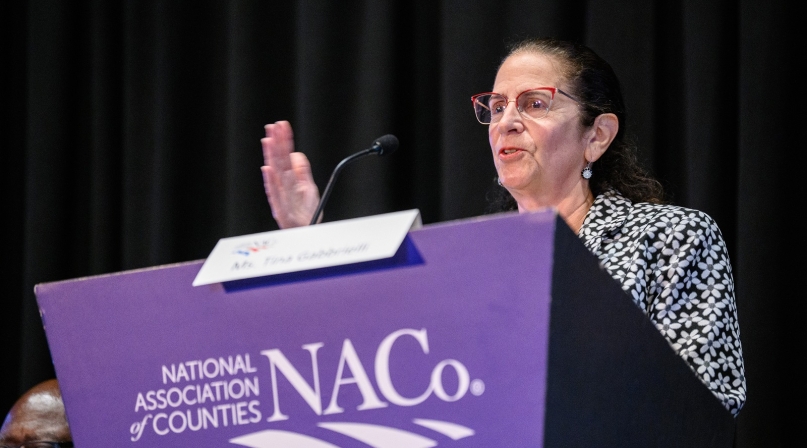DHS warns counties of international adversaries

Key Takeaways
It seems like something out of a spy novel: An employee in a county office getting recruited to collect information for a foreign adversary.
There was a time when most foreign adversaries mainly targeted the federal government, but these days, countries such as China, Russia and Iran are increasingly targeting state and local governments, according to Tina Gabbrielli, director of Counterintelligence, Office of Intelligence and Analysis, Department of Homeland Security.
Gabbrielli sounded the alarm in remarks Thursday, July 21, to members of NACo’s Justice and Public Safety Steering Committee as the NACo Annual Conference in Adams County, Colo. got underway.
Foreign adversaries are “persistent, cunning and target our institutions,” looking to influence policy and destroy U.S. social cohesion and economic prosperity, she said.
She warned county officials to be extra careful when it comes to doing business with unfamiliar companies, especially ones that might bid extra low for a project.
“Know who it is,” she said. “Do they have ties to a foreign adversary? If the price seems too good to be true, there’s probably a reason for that.”
Today, China is using “non-traditional” ways of spying, including recruiting students and businesspeople who may be “witting or unwitting,” Gabbrielli noted. When they reach out to recruit someone, their ties to China may “be hidden or not readily apparent.”
She said that yes, even county employees could be targeted. Employees who are especially vulnerable are those who are having financial difficulties or who are disgruntled. Signs of a “recruit” could be someone with unexplained affluence or is planning foreign travel, she said.
China is even penetrating U.S. law enforcement, she said, and referred to a case that involved a New York City police officer accused of spying on Tibetan immigrants for China.
China, and Russia in particular, are both notorious for using online campaigns to influence elections as it did in 2016 and U.S. officials expect it to happen again this year, Gabbrielli said. The countries’ spies “attempt to weaken our social cohesion and underlying institutions. They will amplify any message they can to sow doubt and discord.”
Other ways that foreign adversaries may stick their fingers in U.S. affairs include investment in real estate, finance, transportation, technology and entertainment — all ways to “collect information to our detriment,” Gabbrielli said.
Counties should also beware of those who may ask to lobby or advance a position on their behalf. Some adversaries use “do good” groups to “rope you in,” she said.
If you suspect any international adversaries are sniffing around your county, Gabbrielli said to contact your nearest FBI office.
Attachments
Related News

Information-sharing bill could protect court workers
The Countering Threats and Attacks on Our Judges Act could provide more than 30,000 state and local judges with access to security assessments, best practices and a database of threats made against colleagues in the justice field.

California counties fight agricultural crime
Sheriffs' offices and prosecutors in California's central valley make specific efforts to prevent and prosecute crimes against the agricultural community.

After historic winter storms, counties assess response
Counties in states that rarely receive much winter weather are assessing their responses to the January storm that left many covered in snow and ice.
